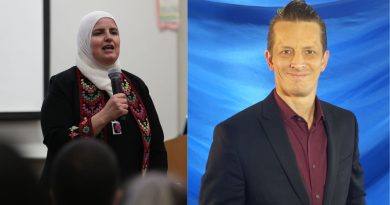Q&A with CDOR Feature Speaker Udodiri Okwandu
Udodiri Okwandu, a doctoral candidate at Harvard University studying the history of science, will be giving a presentation at Campus & Community Dialogue on Race titled “Racism and Medicine: reconciling the past and present” over Zoom on Oct. 25 from 1 – 2:30 p.m. She participated in the following Q&A with El Leńador over email.

To register for her CDOR event follow this link.
What does CDOR’s theme “Truth Telling For Liberation ” mean to you?
Conventional and dominant histories of the United States are rife with silences and absences. The historical subjects who are the victims of these silences — racial and ethnic minorities, women, members of the LGBTQ+ community, and those who are disabled, for example — are those who have been historically marginalized and subjected to immense violence as a means of promoting the white cishetero-patriarchy.
In addition, the ways in which these communities have resisted oppression, exercised their autonomy and agency, and made meaningful contributions to society often go unheard. Failing to capture and elevate these stories constitutes a form of historical erasure and, critically, prevents society from confronting its past and recognizing its consequences in our own moment.
For me, “Truth Telling for Liberation” means intentionally elevating and excavating the voices and narratives of those who have been placed at the margins. It also helps us to understand historic harms and also gives us the tools to more effectively address them.
What do you hope people take away from your presentation, “Racism and Medicine: reconciling the past and present”?
I often reflect on the saying “history doesn’t repeat itself, but it does rhyme”. For me, this captures the intimate connection between our past and our present. In other words, we cannot truly understand contemporary phenomena without understanding our history.
The medical sphere brings this sharply into focus, given that contemporary racial health disparities, medical violence, health inequity, and more are direct relics of the historical development of American medicine — an enterprise that was rooted in racism, misogyny, ableism, and more.
I hope that listeners leave my presentation with not only a clear understanding of the connections between the past and present, but the political stakes of confronting this history.
What advice do you have to students of color at Cal Poly Humboldt that find themselves in predominantly white academic spaces?
Navigating predominantly white academic spaces is a challenge that I have had to face for most of my life. It is not easy and, at many points, have left me questioning my worth and my ability to thrive. There are 3 things that have helped me along the way:
1. Cultivate community: My community has been my rock. They provide a space for me to be myself and also are a source of comfort during challenging times. Investing in my relationships have helped me nurture my emotional and spiritual being which has, in turn, allowed me to more easily confront the challenges I can face in academic spaces.
2. Define your own criteria for success: I have often struggled with wondering if I am “good enough”, “doing enough”, or “prioritizing the right things.” Over time, I have realized that these concerns emerged because I was relying on a framework that was misaligned with my own vision and goals. After taking the time to critically think about what matters to me and how I envision “success” I was able to navigate these spaces with more confidence and feel a deeper connection to my work.
3. Make time for rest: In this capitalistic society, there is so much emphasis on productivity and continuous labor. This will only leave one burnout and jaded. Take time to cultivate rest and peace, as it will give you the energy to invest in your work, community, and dreams.



